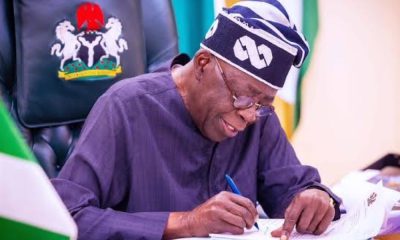Debt Servicing
Nigeria spent 111.8% of revenue on debt servicing before Tinubu emerged president – Shettima
The Vice President of Nigeria, Kashim Shettima, has said that President Bola Tinubu had to make the difficult decision to remove petrol subsidy because he inherited an economy in poor condition with a debt service-to-revenue ratio of 111.8%.
This is contained in a statement by the Special Adviser to Vice President, Stanley Nkwocha, in Abuja on Thursday.
According to Nkwocha, the vice president said the year before Tinubu’s assumption of office, Nigeria paid N111,800 to debtors for every N100,000 earned as revenue.
He quoted Shettima as saying that it is impossible for the Tinubu’s administration to continue in such trajectory, adding that it will only lead to the “inevitable death” of the economy.
Shettima, who spoke at the 2nd Chronicle Roundtable organized by 21st Century Media Services in Abuja, said that the Buhari’s administration did not make any provisions for fuel subsidy in the 2023 budget.
- “We understood why our predecessor made the decision to remove it and refused to budget for it in their final fiscal year. The year before we took office, Nigeria’s debt service-to-revenue ratio had grown to 111.8%.
- “The anticipated debt crisis may sound like fancy economic jargon to the man on the street, but you and I are in a better position to understand how such miscalculations have played out in other countries. It’s an economic death sentence.
- “His Excellency, President Bola Ahmed Tinubu, chose the option that would save the life of the nation, instead of one that would merely prolong its imminent and predicted economic death. Before we took charge, the biggest elephant in the room was the question of fuel subsidy removal.
- “In plain terms, our debt servicing was such that if you earned, say, N100,000, the entirety of the money wasn’t only paid to your debtor; you were forced to borrow an additional N11,800 to pay the debtor.
- “How do you intend to survive this, and how many more loans before you become a pariah?
- “We are not even discussing the nation’s budget deficits, diversions of resources from critical sectors of the economy, and corruption masterminded in the subsidy regime,” Shettima said.
What the data is saying
The Vice President’s claim is similar to data collected by Nairametrics Research Team which indicated that the Federal Government’s debt service to revenue ratio reached a concerning 111.8% in 2022, according to the Central Bank of Nigeria.
- Nairametrics also reported that the government spent N5.65 trillion on debt servicing while only earning about N5 trillion in 2022. This is the highest debt service to revenue ratio recorded in Nigeria’s recent history topping the 96% recorded in 2021.
- Similarly, the government spent N5.79 trillion in the first nine months of this year, which is higher than its debt service budget for that period.
- Accordingly, the Federal Government planned to spend N6.56 trillion on debt servicing in all of 2023.
Nigeria economy to bounce back
In addition, Shettima assured Nigerians that the economy will soon recover to take a positive trajectory.
According to Shettima, the president has steered the ship of state through the economic turbulence and storm he met on ground on assumption of office.
- “We look forward to the positive impact on the economy that will be brought by some of our new initiatives in the oil and gas sector, creative arts sector, the newly rejigged steel and solid minerals sectors, our housing sector, the blue economy, and the digital sectors, to mention but a few.
- “There is no doubt that there’s a time to plant and a time to reap. In between those times, we appeal for patience and seek collective sacrifice from all, especially from us. We wish there were a way to treat this ailment without surgery”, Shettima said.
What you should know
President Bola Tinubu removed the subsidy on fuel on May 29, 2023, during his inauguration speech, adding that the fuel subsidy is “gone.”
- As a result, the price of fuel has increased dramatically, leading to an escalating cost of production and logistics as well as power generation for small and medium-scale businesses across the country.
- Meanwhile, the President assured Nigerians that the money saved from subsidy removal will now be allocated to health and education sectors.
- With an inflation rate of 33.2%, Nigerians battle a high cost of living, rising food prices as well as a hostile business environment, resulting in the decline of employment opportunities across the country.
















